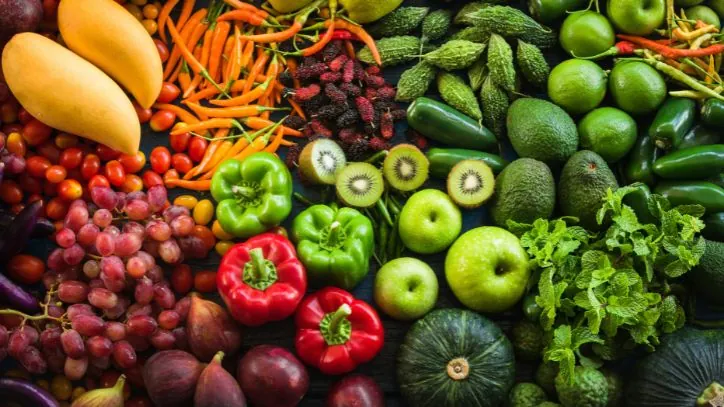Blog
Adults Need Their Veggies Too!

When we think of the perennial struggle of getting children to eat their vegetables, we often forget that adults also face similar challenges. It’s easy to assume that the refusal to eat vegetables is primarily a childlike quirk, but the reality is quite different. A significant number of adults also skip their greens, leading to concerning nutritional gaps.
According to a CDC report, only 9.3% of adults meet their daily vegetable intake requirements, and just 12.2% meet their fruit intake recommendations. These numbers reflect a troubling trend in dietary habits. The importance of incorporating fruits and vegetables into our daily diet cannot be overstated, as they serve as a powerhouse of health benefits. Registered dietitian Kalyn True emphasizes that these colorful foods contain a variety of essential vitamins and minerals that, when consumed regularly, significantly contribute to our overall health.
The Importance of Fruits and Vegetables
Fruits and vegetables provide essential nutrients and have various health benefits that aren’t just reserved for childhood. Here are some critical areas where a lack of these vital foods could negatively impact adult health.
- Decreased Fiber Intake
Fruits and vegetables are some of the best natural sources of dietary fiber, a crucial nutrient that supports gut health. According to registered dietitian Cara Harbstreet, a consistent lack of fiber can lead to many health issues. Dietary fiber helps regulate digestion by adding bulk to stools, making them easier to pass and thereby reducing the risk of constipation. Additionally, fiber has been linked to a lower risk of developing chronic illnesses, such as heart disease and type 2 diabetes. For more information on the health benefits of dietary fiber, you can refer to this Harvard Health article. - Increased Risk of Illness
The lack of fruits and vegetables in an adult’s diet can lead to an increased risk of various diseases. Dietitian Jennifer Hernandez points out that inadequate intake of these foods raises the risk for diseases such as cancer, diabetes, heart disease, high blood pressure, and stroke. Adequate vitamins and minerals are essential for our immune system to function optimally. A diet rich in fruits and vegetables ensures a constant and reliable supply of these nutrients. For further insights on how fruits and vegetables can prevent diseases, consider reading this CDC article. - Lower Energy Levels
Have you ever felt sluggish and lethargic after a meal? The foods we eat are pivotal for fueling our energy levels throughout the day. To convert food into usable energy, our bodies require the vitamins and minerals found in fruits and vegetables. Without these nutrients, our energy levels may plummet. Kalyn True states that including more vegetables and fruits can dramatically improve how we feel throughout the day. For a deeper look at how diet affects energy levels, check out this Healthline article. - Weight Gain
One of the overlooked benefits of regularly consuming vegetables is their low-calorie content. When adults don’t eat enough veggies, they often substitute them with higher-calorie options, increasing the risk of weight gain. Vegetables are filling and nutrient-dense, meaning they provide a lot of nutrition without a lot of calories. By incorporating more vegetables into meals, adults can satisfy their hunger while maintaining a healthy caloric intake. Additionally, opting for fruit as a dessert replaces high-calorie, sugary treats with a healthier, nutrient-packed alternative. For more guidance on maintaining a healthy diet and weight, you can explore this Mayo Clinic resource.

How to Incorporate More Fruits and Vegetables into Your Diet
Understanding the importance of fruits and vegetables is just the beginning. The next step is figuring out how to incorporate more of them into your diet. Here are some practical tips to help you increase your intake:
- Start with Breakfast:
One easy way to increase your fruit intake is to start your day with fruit at breakfast. Adding berries to yogurt, blending a banana into smoothies, or sprinkling diced apples onto oatmeal can significantly elevate your fruit consumption. - Make Salads a Staple:
Salads can be an excellent way to consume vegetables. Start by adding leafy greens like spinach or kale and then layer in colorful veggies such as bell peppers, tomatoes, carrots, and cucumbers. Don’t forget to incorporate beans or legumes for added protein and fiber! - Snack Smart:
Instead of reaching for chips or cookies, keep fresh fruits and vegetables available for snacking. Carrot sticks, cucumber slices, and apple slices with almond butter are both healthy and satisfying. - Experiment with Cooking:
Cooking methods can make a massive difference in both the taste and nutritional value of vegetables. Roasting, grilling, or steaming vegetables can enhance their flavor and textures. Plus, you can experiment with herbs and spices to elevate their taste. For some inspiration, check out these healthy cooking techniques. - Plan Your Meals:
Meal planning can help ensure that you have a variety of fruits and vegetables ready to go. When you plan meals, you can specifically include a variety of produce, ensuring that you’re not just relying on a limited selection. - Use Fruits in Unconventional Ways:
Consider incorporating fruits into savory dishes. Pineapple can add a nice sweetness to grilled chicken, while oranges can enhance a stir-fry. Experimenting with fruit in salads can also lead to surprising and delicious results. - Stay Informed:
Knowledge is power! Staying informed about the benefits of different fruits and vegetables can motivate you to try new options. Websites like Fill Your Plate promote Arizona-grown products and provide resources for integrating more fruits and vegetables into your diet.
The Local Advantage
For residents of Arizona, the advantage of incorporating more fruits and vegetables into your diet goes beyond health benefits. Arizona produces a wealth of fresh, local produce, making it easier to access high-quality fruits and vegetables. From sweet oranges to vibrant peppers and diverse greens, you’ll find an abundance of options at local farmers’ markets and grocery stores.
Visiting farmers’ markets not only provides fresh produce but also supports local farmers and the community. The farm-to-table movement emphasizes the importance of eating fresh and seasonal, which can lead to discovering amazing new dishes and recipes.
You can explore local markets and find seasonal fruits and vegetables near you. Websites like Fill Your Plate can guide you on where to find fresh produce and suggest seasonal recipes, reinforcing the importance of local sourcing in your diet.
Conclusion
In conclusion, it’s crucial to recognize that adults, just like children, need to prioritize their intake of fruits and vegetables. The health implications of neglecting these food groups can be severe, potentially leading to decreased fiber intake, increased disease risk, lower energy levels, and weight gain. Still, the great news is that there are numerous strategies for incorporating more fruits and vegetables into your meals, ensuring you’re providing your body with the nutrients it needs.
Start by making small changes in your diet, like adding fruit to breakfast or snacking on raw veggies. Remember that the availability of local produce in Arizona offers a unique opportunity to enjoy fresh, seasonal foods that benefit both your health and the community. By making fruits and vegetables a regular part of your diet, you not only enhance your health but also contribute to a sustainable food system. So, don’t wait—embrace the many benefits of a colorful, plant-rich diet today!
By Heide Kennedy, Arizona Farm Bureau Communications Intern


















